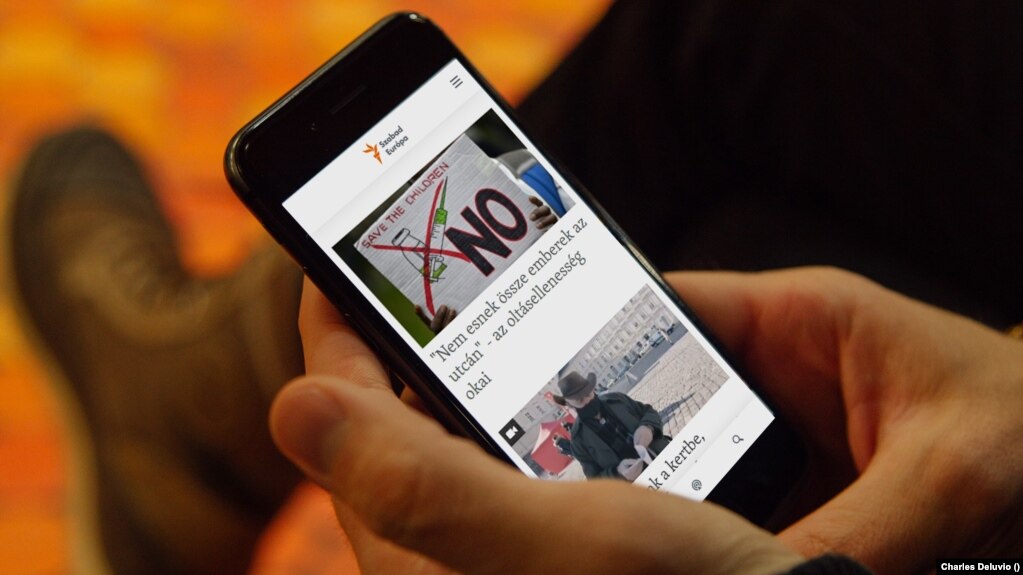In First Year, Szabad Európa Fills Vital Niche In Hungarian Media Scene
In a media environment dominated by outlets associated with the government, RFE/RL’s renewed Hungarian Service, Szabad Európa, has carved out an important role for itself as a trusted, digital-only source of timely, accurate, and non-partisan information.

WASHINGTON, D.C. – In a media environment dominated by outlets associated with the government, RFE/RL’s renewed Hungarian Service, Szabad Európa, has carved out an important role for itself as a trusted, digital-only source of timely, accurate, and non-partisan information. In its first year, Szabad Európa has become a market leader with its original investigations and its reporting on key topics including the COVID-19 crisis and expanding Chinese influence in the country.
“Szabad Európa plays an increasingly rare role in Hungarian media, as an independent and unbiased outlet driven by the public interest and reaching its audience with information and insight not otherwise available to Hungarian news consumers,” said RFE/RL President Jamie Fly. “The Service’s investigations help shape the country’s news agenda, and its reporting on topics of vital interest to all Hungarians has earned it a growing number of followers to its social media platforms, podcasts, and newsletter.”
Some of Szabad Európa’s most influential investigations have revealed efforts by government loyalists managing Hungary’s state news agencies to censor the work of journalists by offering explicit instructions on what to discuss and how. The Service also looked into the activities of a recently-launched and state-funded journalism school that prepares students for jobs at pro-government media outlets, and covered in depth the forced closure of Hungary’s last independent news radio station, Klubradio. Other investigations have examined China’s growing influence in Hungary, including Hungarian government efforts to build in Budapest the first campus within the European Union for a Chinese university, using state budget funds.
Szabad Európa has paid close attention to underreported stories within Hungary, such as the government’s efforts to hide deep poverty and the lack of real jobs in rural areas through public works programs, a deepening digital divide between urban and rural areas, the country’s lack of services for deeply impoverished rural communities. The Service also focused on the impact of the COVID-19 pandemic on the country and the world, and on keeping Hungarians informed about vaccination efforts and other actions they can take to protect themselves from the virus.
RFE/RL’s 2020 return to Hungary marked its third entry into an EU member state. In 2019 it relaunched work in Bulgaria and Romania – where, like Hungary, it played a critical role during the Cold War, reaching well over 50 percent of adult audiences in the 1980s with uncensored radio news. RFE/RL exited Hungary in 1993, but announced plans to return in 2019, as declining media pluralism and disinformation degraded the information landscape. That year, a report by the global monitor Freedom House described Hungary’s “great success in snuffing out critical journalism.” In its 2021 World press Freedom Index, Reporters Without Borders ranked Hungary 92nd among 180 countries surveyed, down 19 places since 2018.
Today’s Szabad Európa is finding significant audiences for its website szabadeuropa.hu, which has averaged nearly 900,000 visits per month in its first year, as well as its Facebook page with over 91,000 followers and nearly 3.4 million video views per month. The Service is also building rich relationships with other independent Hungarian news outlets, which regularly repost Szabad Európa content on their websites.
For more information, contact press@rferl.org.
###
About RFE/RL
Radio Free Europe/Radio Liberty (RFE/RL) is a private, independent international news organization whose programs — radio, Internet, television, and mobile — reach influential audiences in 23 countries, including Russia, Ukraine, Iran, Afghanistan, Pakistan, the republics of Central Asia and the Caucasus. It is funded by the U.S. Congress through USAGM.